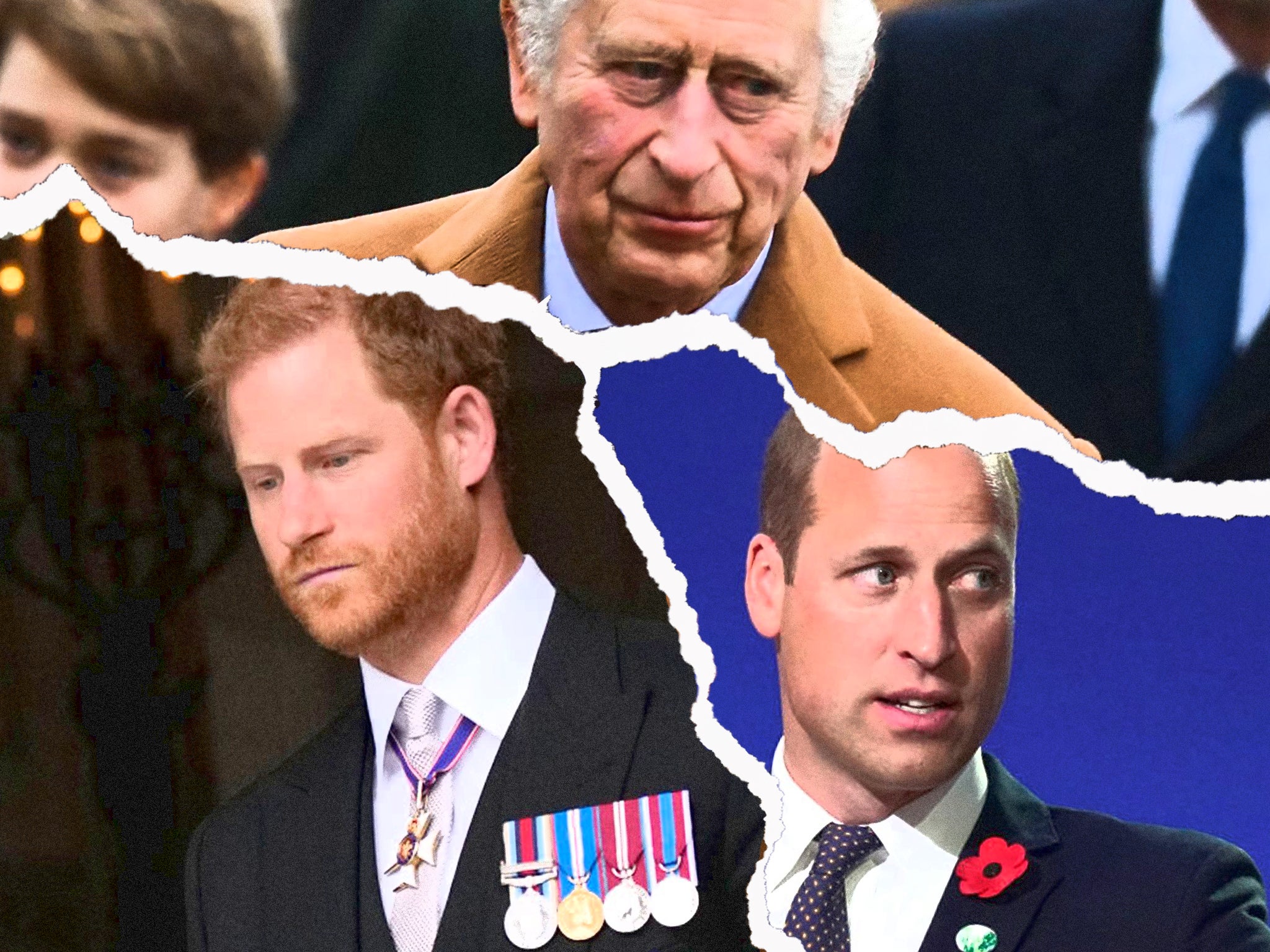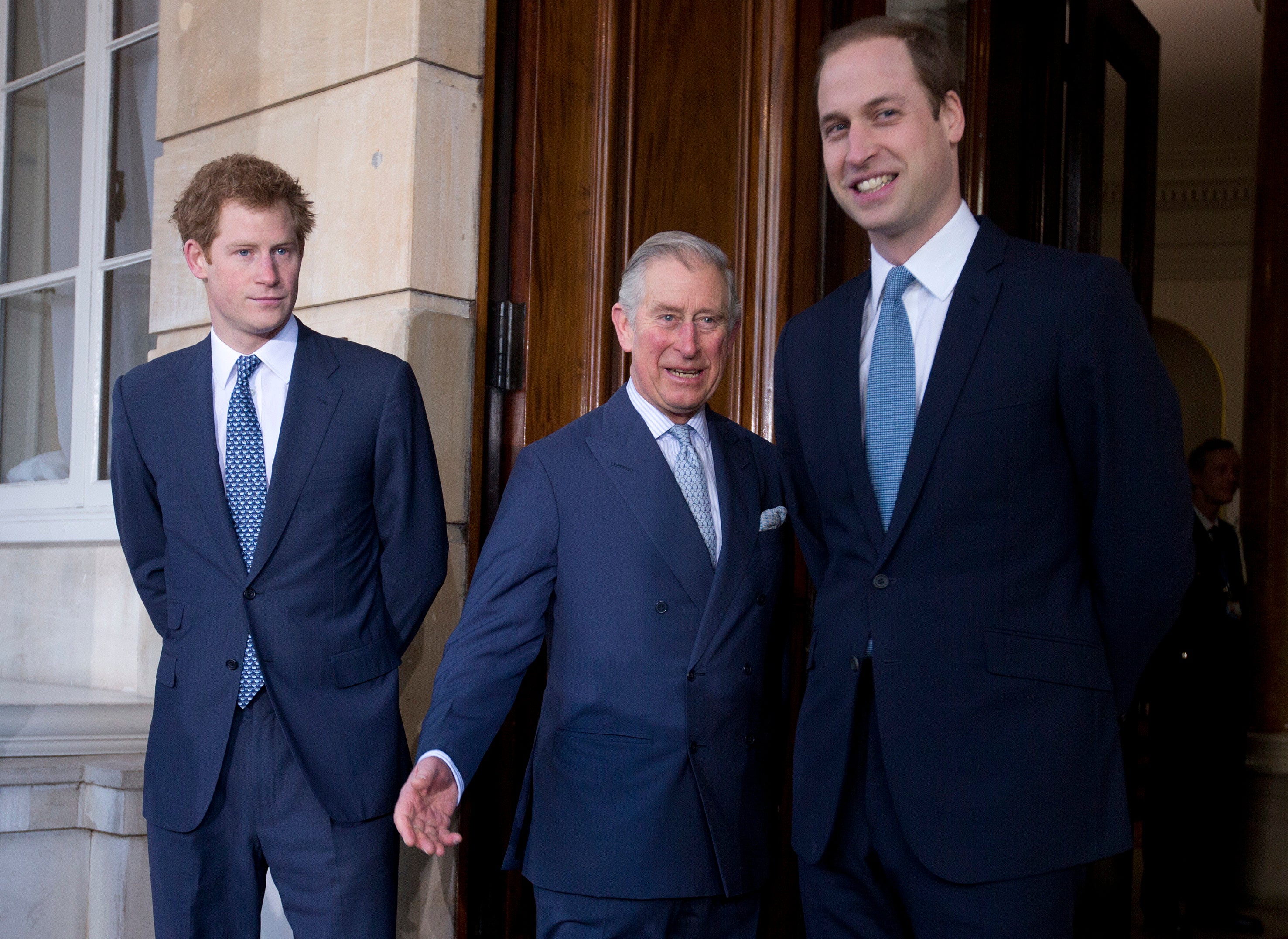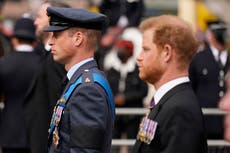‘The father has a dog in the fight’: Does Charles have a responsibility to fix the feud between William and Harry?
Ben Bryant talks to psychologists, therapists and a confidence coach about the prospects for lasting reconciliation after Prince Harry’s devastating memoir, Spare


Your support helps us to tell the story
From reproductive rights to climate change to Big Tech, The Independent is on the ground when the story is developing. Whether it's investigating the financials of Elon Musk's pro-Trump PAC or producing our latest documentary, 'The A Word', which shines a light on the American women fighting for reproductive rights, we know how important it is to parse out the facts from the messaging.
At such a critical moment in US history, we need reporters on the ground. Your donation allows us to keep sending journalists to speak to both sides of the story.
The Independent is trusted by Americans across the entire political spectrum. And unlike many other quality news outlets, we choose not to lock Americans out of our reporting and analysis with paywalls. We believe quality journalism should be available to everyone, paid for by those who can afford it.
Your support makes all the difference.“Conflict is not necessarily a bad thing,” says psychiatrist Dr Sunil Raheja, surveying the present state of the most talked-about sibling relationship in the world. “It can be a good thing if handled correctly. But you need to be very careful about hanging your dirty laundry out in public.”
Perhaps nobody understands this better than the Royal Family, who are famously raised on the philosophy of “never complain, never explain”. Which is what makes the intimacies disclosed in Prince Harry’s memoir Spare so surprising. The Duke of Sussex has provided explosive details of his feud with his brother – while simultaneously appealing for an end to hostilities. “I would like to get my father back; I would like to have my brother back,” he told ITV last week.
The question now is whether a rapprochement is possible.
“Sibling rivalry can be hugely destructive to families,” says Emma Citron, a consultant clinical psychologist. “We all know families who have been totally split by arguments, a stance or an act of behaviour.”
A typical means of reconciliation in such cases is family therapy, says Citron. “I would look for trying to sit down and have brother therapy, with or without dad – and probably with,” she says.
Many psychologists recommend the involvement of a parent in resolving a sibling rivalry. And a kind of detente may have already been attempted by King Charles, Prince Harry’s memoir reveals.
“Please boys, don’t make my final years a misery,” King Charles is reported to have asked after Prince Philip’s funeral in 2021. The future King may have been attempting to calm the waters between his adult sons, who stood on either side of him with “flushed faces”, according to Prince Harry. But if he wishes to pursue appeasement, the King will have to make peace with his own unflattering characterisations.
In one passage, for example, Prince Harry accuses his own father of being a tightwad and of being jealous of his wife, Meghan Markle. “Pa might have dreaded the rising cost of maintaining us, but what he really couldn’t stomach was someone new dominating the monarchy, grabbing the limelight, someone shiny and new coming in and overshadowing him,” he writes.
The book has effectively poured gasoline on the smouldering embers of the Prince’s relationship with his family, with disclosures that are likely to be remembered for years to come. “It’s not an approach I would recommend,” says Citron.
When a psychologist seeks a reconciliation between family members, the process is always private. Family therapy happens behind closed doors, between the relevant family members. The provocation of public disclosures – in a tell-all memoir, for example – only aggravates the process. “It’s got to be a very respectful and confidential process,” says Citron. “Not just another source of exposure to the wider world. That’s really breaking a cardinal rule.”
But the problem for the Duke and Duchess of Sussex is apparent. They have long maintained that their story is being written by a media that is hostile to them, and that they are being briefed against by the Palace itself. They have said that they want to tell their story as they see it – and now they have commercial obligations to do so, via their Netflix and book deals.
“The truth, supposedly, at the moment, has been there’s only one side of the story, right?” says Prince Harry in the ITV interview. “But, there’s two sides to every story.”
The book has filled in many blanks in a feud that first came to the public’s attention in 2018, when Vanity Fair asserted that there was tension between the brothers. Prince Harry’s book confirms that there had been a series of rows that year including one where Kate was reportedly reduced to tears during a bridesmaid dress fitting for Charlotte.
A reconciliation was attempted, according to the book – but this too descended into chaos. Kate and William invited Harry and Meghan over to their flat in Kensington Palace for tea and biscuits to “relax the atmosphere” between the couples. The conflict escalated, culminating in William calling Meghan “rude” and pointing a finger at her. Meghan told William: “If you don’t mind, keep your finger out of my face,” according to the book.

The rift reportedly deepened in 2019, when Prince Harry claims that William physically attacked him in a row over his marriage to the actor. William called Meghan “difficult”, “rude” and “abrasive”, the book claims, during a confrontation at Nottingham Cottage, on the grounds of Kensington Palace. Harry accused his brother of “parrot[ing] the press narrative” about his American wife. The incident escalated, and Harry was knocked to the floor, ripping his necklace and cracking a dog bowl the Prince – aged 35 at the time – fell on.
Harry and Meghan moved away soon after, first to Frogmore Cottage in 2019, to Vancouver in early 2020, and then to Los Angeles in March 2020.
Violence between boys is “pretty common”, according to Kevin Burch, a confidence coach who specialises in young men. “But it’s much less common for it to continue into their twenties or thirties,” he says.
It may be appropriate for King Charles to facilitate a resolution, says Burch. But the problem is complicated by the fact that William is his heir, and therefore a kind of favourite (which Prince Harry alludes to in the title of his memoir Spare). “The father isn’t neutral in that the father has a dog in the fight,” says Burch.
A reconciliation should happen on neutral ground. It is possible, however, that the rest of the family may regard the therapist’s couch and its associated language and concepts as the natural habitat of Prince Harry and Meghan Markle. This is the Prince who – after a fight with his brother – says he called his therapist before he called his wife.
“Prince Harry’s familiarity with therapy potentially is a good thing, because it’s putting somebody in tune with their internal world and their suffering,” says Citron. “But one doesn’t want to weaponise that process. One wants to use it for reconciliation, and bridge building,”
If all parties act in good faith, resolution is possible. But there remains a sticking point in the culture clash at work between Prince William, who remains wedded to the stiff upper lip of his ancestors, and Prince Harry, who has thrown his lot in with the radical openness of his West Coast friends – who may be less censorious of Prince Harry’s public statements.
“In any negotiation you have to start by finding the common ground,” says Burch. “A common ground here could be, ‘How can we help bring the family together so it has value, and have a love for each other?’
“But you also have to keep your mouth shut. The challenge for Charles,” Burch adds, “is the risk that whatever he says is going to end up in the papers.”



Join our commenting forum
Join thought-provoking conversations, follow other Independent readers and see their replies
Comments